For the 2025 school year, there are 2 public middle schools serving 443 students in Hoquiam School District. This district's average middle testing ranking is 2/10, which is in the bottom 50% of public middle schools in Washington.
Public Middle Schools in Hoquiam School District have an average math proficiency score of 13% (versus the Washington public middle school average of 36%), and reading proficiency score of 33% (versus the 51% statewide average).
Minority enrollment is 39% of the student body (majority Hispanic), which is less than the Washington public middle school average of 50% (majority Hispanic).
Overview
This School District
This State (WA)
# Schools
6 Schools
800 Schools
# Students
1,588 Students
302,560 Students
# Teachers
98 Teachers
16,189 Teachers
Student : Teacher Ratio
16:1
16:1
District Rank
Hoquiam School District, which is ranked within the bottom 50% of all 306 school districts in Washington (based off of combined math and reading proficiency testing data) for the 2021-2022 school year.
The school district's graduation rate of 80-84% has increased from 75-79% over five school years.
Overall District Rank
#271 out of 307 school districts
(Bottom 50%)
(Bottom 50%)
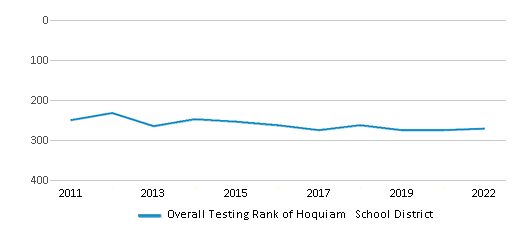
Math Test Scores (% Proficient)
20%
40%
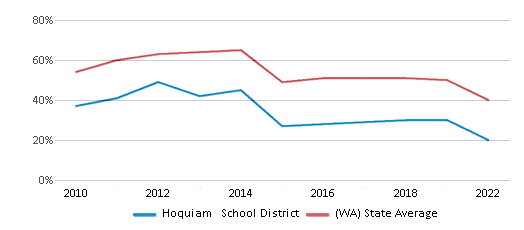
Reading/Language Arts Test Scores (% Proficient)
33%
53%
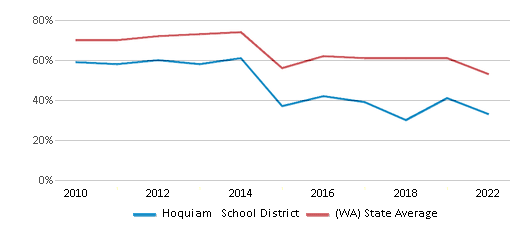
Science Test Scores (% Proficient)
36%
49%
Graduation Rate
80-84%
84%
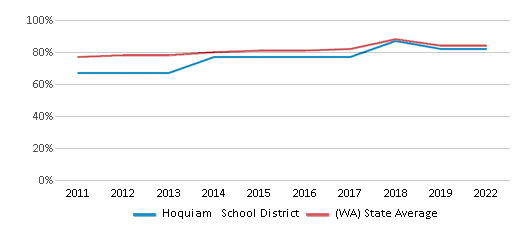
Students by Ethnicity:
Diversity Score
0.57
0.68
# American Indian Students
66 Students
5,703 Students
% American Indian Students
4%
2%
# Asian Students
15 Students
23,666 Students
% Asian Students
1%
8%
# Hispanic Students
408 Students
73,370 Students
% Hispanic Students
26%
25%
# Black Students
21 Students
13,426 Students
% Black Students
1%
5%
# White Students
962 Students
148,736 Students
% White Students
61%
50%
# Hawaiian Students
4 Students
3,970 Students
% Hawaiian Students
n/a
1%
# Two or more races Students
108 Students
26,275 Students
% of Two or more races Students
7%
9%
Students by Grade:
# Students in PK Grade:
36
1,563
# Students in K Grade:
107
3,945
# Students in 1st Grade:
117
4,184
# Students in 2nd Grade:
119
4,295
# Students in 3rd Grade:
104
4,473
# Students in 4th Grade:
116
4,820
# Students in 5th Grade:
116
7,072
# Students in 6th Grade:
130
71,936
# Students in 7th Grade:
117
81,343
# Students in 8th Grade:
131
82,029
# Students in 9th Grade:
139
11,117
# Students in 10th Grade:
106
8,145
# Students in 11th Grade:
116
8,299
# Students in 12th Grade:
134
9,339
# Ungraded Students:
-
-
District Revenue and Spending
The revenue/student of $19,987 is higher than the state median of $18,796. The school district revenue/student has stayed relatively flat over four school years.
The school district's spending/student of $20,971 is higher than the state median of $19,246. The school district spending/student has stayed relatively flat over four school years.
Total Revenue
$32 MM
$20,715 MM
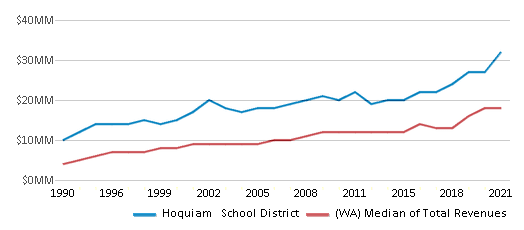
Spending
$33 MM
$21,212 MM
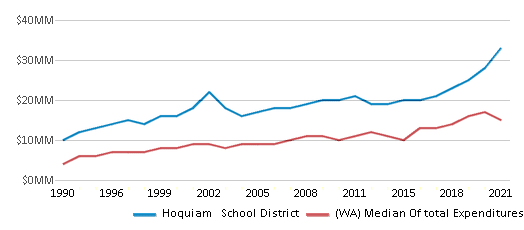
Revenue / Student
$19,987
$18,796
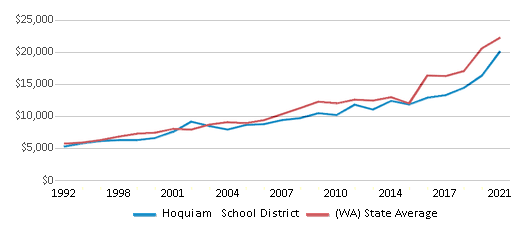
Spending / Student
$20,971
$19,246
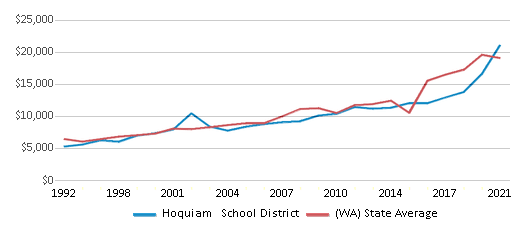
Best Hoquiam School District Public Middle Schools (2025)
School
(Math and Reading Proficiency)
(Math and Reading Proficiency)
Location
Grades
Students
Rank: #11.
Hoquiam Middle School
(Math: 14% | Reading: 33%)
Rank:
Rank:
1/
Bottom 50%10
200 Spencer
Hoquiam, WA 98550
(360) 538-8220
Hoquiam, WA 98550
(360) 538-8220
Grades: 6-8
| 357 students
Rank: #22.
Hoquiam Homelink School
(Math: 6-9% | Reading: 30-34%)
Rank:
Rank:
1/
Bottom 50%10
2500 Simpson Ave
Hoquiam, WA 98550
(360) 538-8200
Hoquiam, WA 98550
(360) 538-8200
Grades: K-12
| 86 students
Recent Articles

Year-Round Or Traditional Schedule?
Which is more appropriate for your child? A year-round attendance schedule or traditional schedule? We look at the pros and cons.

Why You Should Encourage Your Child to Join a Sports Team
Participating in team sports has a great many benefits for children, there is no doubt. In this article you will learn what those benefits are.

White Students are Now the Minority in U.S. Public Schools
Increasing birth rates among immigrant families from Asia and Central and South America, combined with lower birth rates among white families, means that for the first time in history, public school students in the United States are majority-minority. This shift in demographics poses difficulties for schools as they work to accommodate children of varying language abilities and socio-economic backgrounds.





